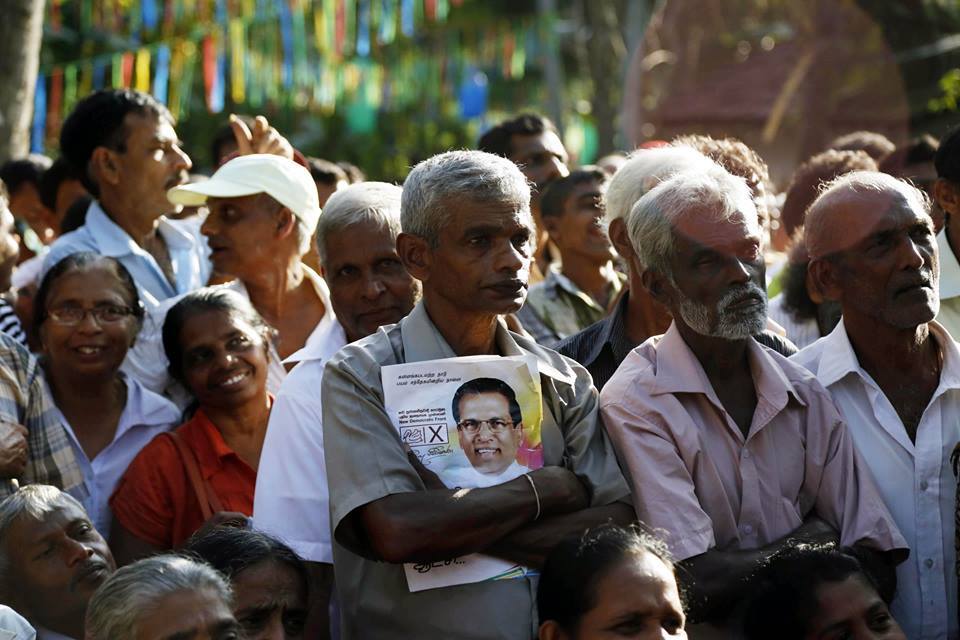Sri Lanka – A Nation Torn Between Chronic Political Corruption & Inadequacy Of Public Activism

 ‘A Gura not heeding good advice; it does not matter whether he travels on the higher plane or the lower plane ’ goes a popular Sinhala adage. In the context of the political corruption cesspit, Sri Lanka has fallen into, this adage quite deservingly applies to its’ people too, who despite repeated advice continue to mourn after getting deceived regularly by sending a different set of political actors at each election to represent them based on idle promises; knowing subconsciously that they all are the products of the same underlying corrupt political system and culture. From one ‘Bangalawa’ to another, the political leadership changes hands and the ultimate result has always been the continuation of the system of exploitation and corruption, hidden under different laudable political slogans; at times marketed with some cosmetic changes. It is therefore nothing but insanity to do the same thing over and over again and expect different results. Yes! every nation then gets the government it deserves as philosopher Joseph de Maistre once said. So, does Sri Lanka!
‘A Gura not heeding good advice; it does not matter whether he travels on the higher plane or the lower plane ’ goes a popular Sinhala adage. In the context of the political corruption cesspit, Sri Lanka has fallen into, this adage quite deservingly applies to its’ people too, who despite repeated advice continue to mourn after getting deceived regularly by sending a different set of political actors at each election to represent them based on idle promises; knowing subconsciously that they all are the products of the same underlying corrupt political system and culture. From one ‘Bangalawa’ to another, the political leadership changes hands and the ultimate result has always been the continuation of the system of exploitation and corruption, hidden under different laudable political slogans; at times marketed with some cosmetic changes. It is therefore nothing but insanity to do the same thing over and over again and expect different results. Yes! every nation then gets the government it deserves as philosopher Joseph de Maistre once said. So, does Sri Lanka!
While many of us may not be governance specialists; we can however equally relate to the impacts of good and bad governance. It needs no rocket science for ordinary citizenry to realize that good governance (GG) in Sri Lanka is still a distant dream. It was in 2015 that this catchy slogan came into public prominence which ultimately led to a downfall of a powerful government which till then was held in high regard in the light of the ‘war’ victory. Many civic anti-corruption groups cautioned the general voting public to avoid sending the corrupt and those with adverse criminal track records to seats of power. Ven Sobitha Thero spearheaded this campaign to raise public awareness ; however both the public did not heed this advice and the government which came to power on the GG bandwagon also had the last laugh by brining such shady characters through the national list route. Three and a half years later, people are belatedly seeing through this deceit, with their long felt aspirations for GG being utterly frustrated. But, without a nationwide will and lack of public activism to the required level, to change the political culture, the corrupt political class will always triumph.
True! if social media and ‘coffee shop’/ train conversations are anything to go by to gauge the mood and feelings of the people, there is widespread disappointment about- far beyond just political names – of the democratic and electoral political system itself whereby they express their will and change governments through the ballot at regular intervals. In fact, the whole drama enacted through this (then) popular GG fallacy when Maithri/Ranil initially came into power fell apart, when those entrusted by the people to catch the thieves ultimately ended up thieving themselves through the famous CB scam. People were further treated to Thamashas and entertainment for the next few years, with many few high placed politicians in the former government , prosecuted charged by the FCID/ Bribery and Corruption Commission, ended up having a short lived gala time either in the Prisons or the prison hospital ( a luxury not afforded to the ordinary folks accused of even much-much less graver crimes); other cases are still waiting to see the light of the day being put on the back burner. Meanwhile, the cancer of corruption appear to have pervaded beyond the political arena, into the entire gamut of public and judicial service too, judging by many shocking revelations from public spirited whistle blowers, who are unfortunately being given the ‘achchu’ treatment by respective professional bodies to suppress the truth from coming out into the public domain.
It was recently, that the nation was treated to another round of revelations; this time emanating from overseas, from a leading newspaper in the US- the NYT, which revealed in a comprehensive article dated 25th June 2018, the massive extent of corrupt deals involving MR, when ‘China was getting Sri Lanka to cough up a Port’ as the headline suggested, presenting a stark illustration of how China and the companies under its control ensured their interests in a small country hungry for financing like Sri Lanka. It was left for an overseas newspaper to reveal details of these shady deals, and as it was pointed out, apart from putting a debt trapped Sri Lanka at the mercy of their Chinese slave driver, these mega deals had international implications as well. NYT echoed ‘Mr. Rajapaksa was voted out of office in 2015, but Sri Lanka’s new government struggled to make payments on the debt he had taken on. Under heavy pressure and after months of negotiations with the Chinese, the government handed over the port and 15,000 acres of land around it for 99 years in December. The transfer gave China control of territory just a few hundred miles off the shores of a rival, India, and a strategic foothold along a critical commercial and military waterway. The case is one of the most vivid examples of China’s ambitious use of loans and aid to gain influence around the world — and of its willingness to play hardball to collect.The debt deal also intensified some of the harshest accusations about President Xi Jinping’s signature Belt and Road Initiative: that the global investment and lending program amounts to a debt trap for vulnerable countries around the world, fueling corruption and autocratic behavior in struggling democracies’. The inherent corrupt deals have been subsequently coming out through glaring revelations made both in and out of Parliament even providing details of cheque numbers paid to MR and Co. as well. Unfortunately the debate on the NYT article do not appear to have elicited much interest, judging by poor Parliamentary attendance- another waste of public money. Meanwhile, many foreign activists have been citing Sri Lanka as a prime example while advising their countries against falling into the Chinese debt trap; examples being Malaysia and Kenya to cite two of them.

